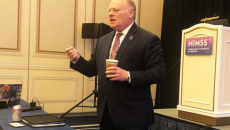HIMSS25
Chad Dodd, vice president of product management at athenahealth, sat down with MobiHealthNews to discuss Ambient Notes and how the company's AI-enabled products have evolved.
Technology and business operations leaders from Medical University of South Carolina offered some useful tips and strategies on collaboration, continuous improvement and more at HIMSS25 on Wednesday.
HIMSS25 sessions on change management, the upcoming government spending bill and suggestions for aligning interoperability goals with Trump administration policies are today's topics with our top journalists.
Challenging staff coordination, problems with patient flow, poor equipment management – these are responsible for significant waste, says the CEO of Kontakt.io. Succeed with those, then move on to the exciting things like artificial intelligence.
Invest in open, scalable infrastructure to ensure long-term adaptability, reduce technical debt and position to integrate emerging technologies without costly overhauls, advised Jeff Fallon, CEO of Vibe Health by eVideon.
And to deliver a seamless patient experience, providers should take a holistic approach to payment processes, considering touchpoints including in-person locations, phone services, online platforms and mobile apps, says TrustCommerce at HIMSS25.
"The future of healthcare depends on vendor-neutral interoperability, ensuring technology works for care teams rather than complicating their jobs," Sandy Saggar of Connexall contends.
Advocate Health uses a FHIR-enabled integration with its electronic health records to get customized information to patients before, during and after more than 200,000 annual well-child exams – achieving a 30% lift in patient engagement.
Tom Leary, senior vice president and head of Government Relations at HIMSS, gives a rundown of healthcare priorities.
HIMSS President and CEO Hal Wolf addresses research cuts, the workforce shortage and digital health during a press conference.









